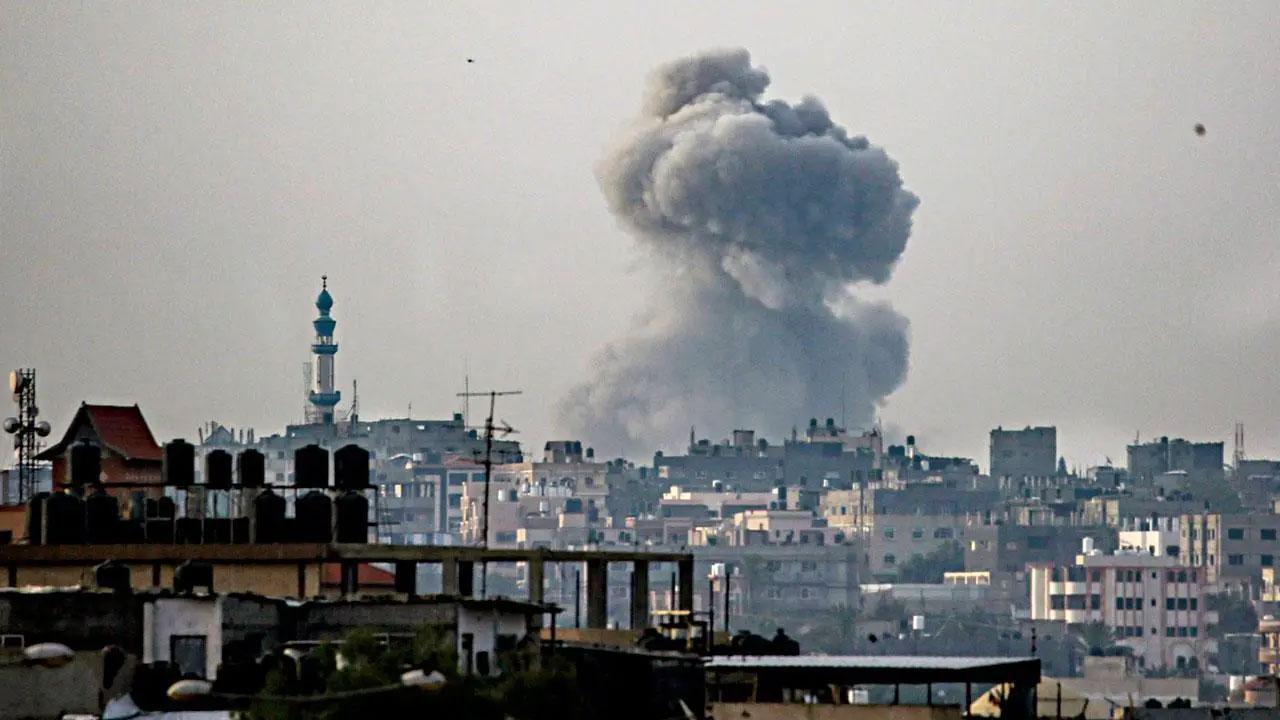A drone strike hit the school they were sheltering

Smoke billows during Israeli bombardment in eastern Rafah in the southern Gaza Strip. Pic/AFP
At least 10 people, including children, were killed in Gaza on Sunday after a drone strike hit the school they were sheltering, CNN reported, citing local health workers.
The Al-Nazla school in Saftawawy, on the outskirts of Jabaliya, was being used as a temporary shelter by people fleeing violence when the drone strike took place. Speaking to CNN, an eyewitness, Saleh Al-Aswad from Jabaliya, said that his son-in-law is undergoing treatment for injuries suffered during the attack.
He added that a "man making bread for his children, thinking this was a safe space," was killed along with his daughter, Afnan, and his son, Mohamed. The news of the strike comes at a time when United Nations agencies have warned that the humanitarian situation continues to deteriorate.
In a statement shared on X on Saturday, the United Nations Office for the Coordination of Humanitarian Affairs (OCHA) warned that Gaza's healthcare system "is on its knees" as access to hospitals and facilities shrink further amid supply shortages and attacks.
The OCHA report, citing the WHO said that, as of Friday, 15 out of 36 hospitals in Gaza were only partially functional, 21 hospitals were out of service, and there were six functional field hospitals. The agency said that the existing hospitals were functioning at more than four times their bed capacity, the agency said, citing the Gaza Ministry of Health.
It further added, "Shortages in fuel, medical supplies and equipment are threatening the ability of the remaining health facilities to operate." The director of the Kuwait hospital in Rafah shared a video on WhatsApp to "sound the alarm to the WHO to keep this hospital operational and to guarantee it doesn't shut down by providing it with the necessary fuel," according to CNN report.
In the video message, Suhaib al-Homs said the Kuwait Hospital is now the only functioning hospital in central Rafah where people can reach "around the clock" as the field hospitals in surrounding areas are difficult to access without an ambulance.
He said, "We are warning of the mounting health crisis as hospitals are going out of service and the collapse of the health sector." He further added, "We will keep on working and the medical teams will keep doing their job. What's happening now makes us more steadfast and adamant to fulfill our duty to serve our people."
The UN aid agency has warned that some displaced people in central Gaza are now surviving on 3 per cent of the minimum standard for daily water needs and that communicable diseases, including diarrhea and suspected Hepatitis A, continue to rise among children, particulary those who are below the age of five.
Earlier this week, the WHO head urged Israel to ease all restrictions on aid entering the Gaza Strip and stressed that the primary route for vital medical aid to enter Gaza from Egypt had been cut off amid Israel's ongoing military operation on the southern Gaza city of Rafah. On Friday, the United Nations' top court has ordered Israel to halt its operations in the southern Gaza city of Rafah and withdraw from the enclave, CNN reported.
The International Court of Justice (ICJ) situated in The Hague, Netherlands gave the order on Friday, in the case brought by South Africa accusing Israel of genocide, citing "immense risk" to the Palestinian population.
"Israel must immediately halt its military offensive and any other action in the Rafah Governorate which may inflict on the Palestinian group in Gaza conditions of life that could bring about its physical destruction in whole or in part," said Judge Nawaf Salam, president of the International Court of Justice (ICJ), CNN reported.
Notably, the decision marks the third time this year, the 15-judge panel has issued preliminary orders seeking to rein in the death toll and alleviate humanitarian suffering in Gaza. However, it is pertinent to note that while orders are legally binding, the court has no police to enforce them.
The court stated that the humanitarian situation in Gaza had deteriorated "even further" since the court last ordered provisional measures in March."The humanitarian situation is now to be characterized as disastrous," Salam said.
This story has been sourced from a third party syndicated feed, agencies. Mid-day accepts no responsibility or liability for its dependability, trustworthiness, reliability and data of the text. Mid-day management/mid-day.com reserves the sole right to alter, delete or remove (without notice) the content in its absolute discretion for any reason whatsoever
 Subscribe today by clicking the link and stay updated with the latest news!" Click here!
Subscribe today by clicking the link and stay updated with the latest news!" Click here!










